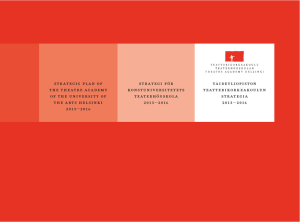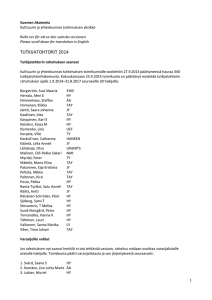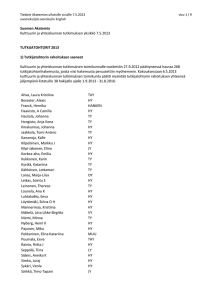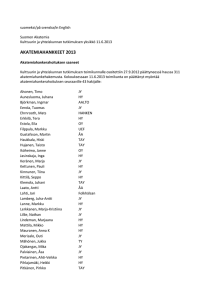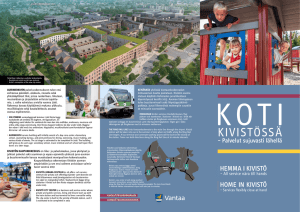Living+02092014-fokus
advertisement
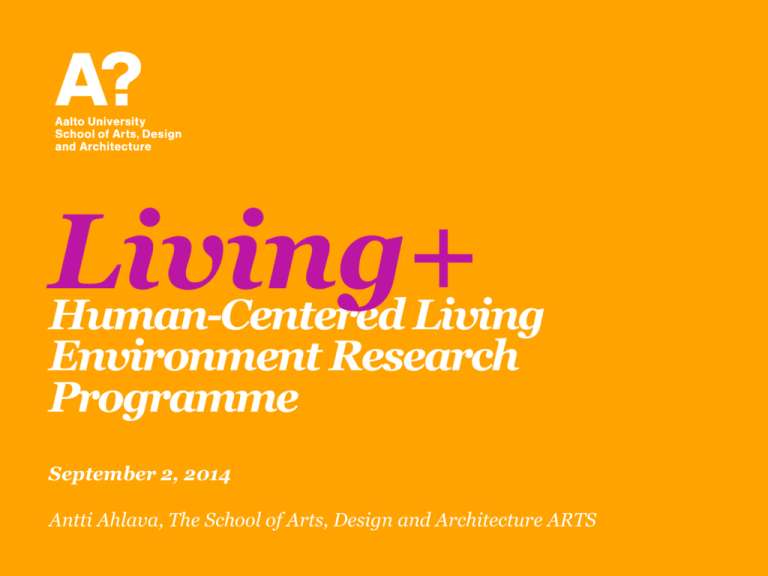
Living+ Human-Centered Living Environment Research Programme September 2, 2014 Antti Ahlava, The School of Arts, Design and Architecture ARTS Living+ is one of the three strategic research programmes of Aalto University 1) Aalto Energy Efficiency AEF 2012-16 2) Human-Based Living Environment Living+ 20143) Aalto Digital Platform 2014- Living+ Living+ is led by Aalto University School of Arts, Design and Architecture (ARTS), which has invited all theother schools of Aalto University and external partners to join the programme. ARTS pursues communicative and collaborative design in all of its fields. Communicative methods is the paradigm addressing many fields of ARTS. Architects’ clients have always been in great extent the users. The so-called communicative change has taken place in urban planning already since 20 years. Presently, co-design has entered also the traditionally industry and product oriented design. Collaborative design has turned the focus of the fields of design to collaboration and users. The background of Living+ was Aalto’s role in the World Design Capital Helsinki year 2012 with the emphasis on ‘better life’. Living+ Why? –Aalto University emphasises social responsibility. Living+ Who? –Cross-disciplinary groupwork is another strategic emphasis ofthe university. How? –The Living+ project preparation suggested 4M €/year, equal with the AEF program. Now the university seems not to have the adequate funding and external support is needed. Living+ Why? –The Human-based environment is in itself an old theme, connected to the solving of the problems of the industralization in the 19th century, developing housing circumstances and humanitarian advancement. The solutions for these challenges have been most of all laws, rules and norms created by official authorities and politicians. Contrasting with this authoritarian top-down principle, the Living+ targets to wellbeing from the grassroots viewpoint of an active user. Living+ is a multidisciplinary program of Aalto University, drawing from research to enable planning, design and testing of better environment in all scales. THE CULTURE OF SHARING • The future of more responsible welfare and everyday wellbeing • Social sustainability, diversity and tolerance of life styles, multiculturalism and living preferences • The urbanization of shared spaces • Shared services: health, social care, aging population • The quality of shared landuse and places • Shared natural environment Solving problems of human life, from utopia to reality User experience, quality of life Communities, place-making, territories, mobility • • • • Shared digitality Shared technology The future requirements of shared housing, services and work Shared economy and business Housing, workplaces, services Living+ THE FOCUS OF THE PROGRAM IS IN THE CULTURE OF SHARING Living+ Living+ Who? –Key persons and capabilities have been mapped. Aalto university: ARTS Tuuli Mattelmäki, Antti Ahlava ECON Johanna Moisander ENG Raine Mäntysalo SCI Kimmo Kaski (Mikko Sams, Erkki Oja, Samuel Kaski, Timo Honkela, Tapio Takala) ELEC Heikki Hämmäinen, Riku Jäntti, Peter Reichl, Raino Sepponen, Arto Visala, Liisa Halonen CHEM Kari Heiskanen, Olli Dahl, Markku Hurme Service economy Service innnovations Service Factory Corporate responsibility Organization and the subjects of study Living+ Helsinki University collaboration / Urban Academy Aalto University / Living+ • • • • • • • • • SCI BIZ ARTS Usability Management and processes ELEC ENG Responsible for preparation: AALTO ARTS Building design Landscape architecture Urban planning Urban design SOTERA Design Service design Co-design Environmental art • Minor studies program • Research collaboration Mathematics and natural sciences Geosciences Strategic planning Mobility Construction Geography and geosciences Environmental sciences Social sciences CHEM Societal collaborators ACADEMY OF FINLAND TEKES PRIVATE SECTOR PUBLIC SECTOR SHOK:S THIRD SECTOR International Design Foundation, Helsinki SITRA Project collaborators Living+ network in Aalto University elec pilot project 1 sci 62 experts from all 6 schools 22 projects registered in Living+ project bank Network members join projects coordinated by each other Pilot projects get seed funding from Living+ 2014 budget pilot project 2 arts eng chem pilot project 3 biz Living+ tot. 22 projects registered in project bank Ehdotetut pilottiprojektit / Suggested Pilot Projects 1/2 (red = with some Living+ funding) 1) Sustainable Building Design with Shared Resources and Technology / Rakennustekniikan yhteistyö Harvardin yliopiston kanssa. Alkanut elokuussa yhteistyöseminaarilla, aiheena elinkaarirakentaminen ja kestävä rakennettu ympäristö. ARTS / Creative Sustainability / Tiina Laurila / ENG Juha Paavola [human based construction and social sustainability] 2) Human-Based Modular Systems: Housing and Resilient Development Aid Design / Modulaarinen asuminen ja palveluiden kehittäminen Nagoya Institute of Technologyn, Filippiinien hallituksen ja Toyota Home:n kanssa. ARTS / Creative Sustainability, Tiina Laurila ja CHEM / Daishi Sakaguchi [environmental problem solving, future housing, communicative design] 3) Exporting Future Wellbeing Cities / Yhteistyössä Tsinghua-yliopiston kanssa (Kiina) ARTS / Sari Dhima / Muotoilun laitos ja Pirjo Sanaksenaho / Arkkitehtuurin laitos [future of wellbeing, social and health care, rapid urbanization, communicative design] 1) Shared Services: Service Design and Service Architecture / yhteistyössä Rio de Janeiron PUCyliopisto, Rion kaupunki ja Maailmanpankki. ARTS / Jarmo Suominen / BIZ Virpi Tuunainen (tietojärjesteämät, mobiilipalvelut), Annukka Jyrämä [social sustainability, future services and mobility, digital culture, communicative design] 2) Shared Working Spaces and Shared Learning / yhteistyössä RCA:n (Dan Phillips, Lontoo), Rio PUC:n, Harvard GSD:n (Mark Mulligan & Kiel Moe), MIT:n Media Labin (Kent Larsen) ja Tongjiyliopiston (Su Yinshang & Lou Yonqqi) kanssa. ARTS Jarmo Suominen / SCI Suvi Nenonen, Matti Vartiainen, Marko Nieminen, Matti Hämäläinen [usability management, processes, services, environment, communicative design, mobile everyday life] Living+ Ehdotetut pilottiprojektit / Suggested Pilot Projects 2/2 (red = with some Living+ funding) 6) Shared Land-Use: The Arctic Dimension and Local Ecological Cultures / Maankäytön pohjoinen ulottuvuus, yhteistyöhanke Harvardin yliopiston prof. Neil Brennerin ja Hokkaidon yliopiston kanssa. Sis. Quileute-intiaaniheimon reservaatin kestävä kehittäminen, yhteistyössä Harvard GSD:n Rahul Mehrotran ja Felipe Correan kanssa. ARTS / Arkkitehtuurin laitos / Frances Hsu ja Trev Harris [social sustainability, environment, services, land-use, aging population, communicative design] 7) Smart Shared City / Älykäs kaupunki jaettujen resurssien näkökulmasta. Sis. osallistuminen Kalasataman älykäs kaupunginosa –hankkeeseen ja Forum Viriumin vetämään Fiksu kaupunki – projektiin yhdessä Tongji-yliopiston kanssa. ARTS / Antti Pirinen / Muotoilun laitos / [smart city, logistics, business, communicative design] 8) City on Demand / Tapauskohteena Pitäjänmäen palvelulähtöinen uudistaminen yhteistyössä Havardin yliopiston (Allen Sayegh ja Nashid Nabien) Helsingin kaupungin, Flexim oy:n, Sweco Oy:n ja Elisa Oy:n kanssa. ARTS / Jarmo Suominen, Arkkitehtuurin laitos [services, housing, workplaces, communicativite design, service models, optimized resources] Living+ How? –Cross-disciplinary research viewpoints and methods Living+ Cross-disciplinary research perspectives Ontology The definition of a central human being: artist/designer (subjective), client (mediative) or user (objective) Teleology The aim of human-centeredness: needs or aspirations Pragmatism Solving wicked questions Linkage to concrete urban projects Hermeneutics The production of new user-centered knowledge and understanding utilized in decision making Metaphysics Design and planning concepts and solutions Markets Methodology Inter-disciplinary Participation, communication, governance and advocacy Cultural relativity Culture and locality Technology Digital information, interfaces and representation (GIS, GPS, simulations) Normativity Norms and regulations producing wellbeing, safety and health Living+ Living+ Programme structure Space Physical locations Urban Academy Established between Aalto and HU Knowledge mapping Defining focus & registering existing expertise in Aalto Learning Teams Development of common study modules External national funding Public and private International collaborators Mapping the interest of foreign universities Research call Internally at Aalto, crossdisciplinary teams National collaborators Mapping the interest of Helsinki, Espoo, Vantaa, Pori, ministries, other cities 2013 Programme Manager, Appointed a single contact point and research leader Steering Group Nominated management and Research monitoring Common research Postdoc/coordinator Symposia recruited Dialogue between the academia and the society started International funding EU, World Bank Visitors Top specialists start to pour in 2014 Evaluation of the programme Research Programme 3-4 (-7) yrs, xM€/year funding from the university 2015 - 2018 2018 - 2019
